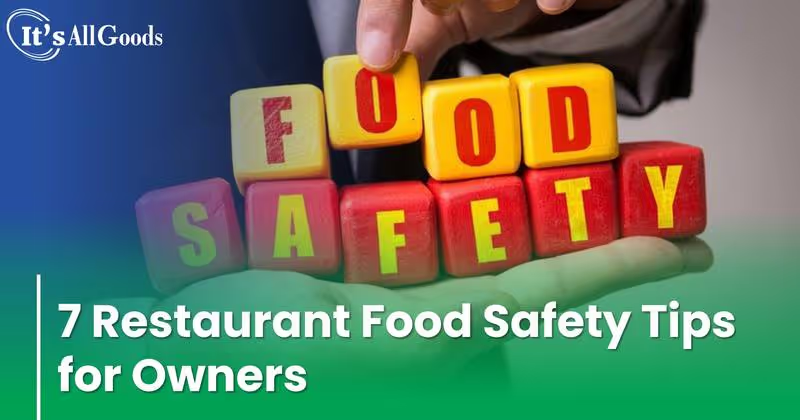

f you've ever fallen ill after eating at a restaurant, you may have contracted salmonella. Salmonella affects around 1.35 million Americans each year. This foodborne illness typically spreads to people when food handlers don't practice good hygiene, like adequately washing kitchen tools between uses and washing their hands. Symptoms can develop in as little as 12 hours and last several days. As a restaurant owner, if your customers are experiencing salmonella symptoms after dining at your establishment, you may need to review restaurant food safety practices. Refreshing your staff on food safety guidelines can help reduce the risk of foodborne illnesses. Keep reading if you want to learn some food safety tips for restaurants. This article gives you seven to help guide you in the right direction.
One of the first kitchen safety tips you should follow is to practice good personal hygiene while in the kitchen. This means washing hands regularly, keeping your hair tied back, using a hair net if necessary, and washing your uniforms and aprons adequately.
Furthermore, your staff should avoid wearing jewelry or having long or false nails. These can carry germs or fall off and contaminate the food during handling and preparation.
• Pro Tip: If you wear rings, take them off and string them onto a necklace and wear them around your neck while on shift
If your restaurant is cutting corners and not using the proper food storage, you could be putting your patrons at risk of catching a foodborne illness when they consume your food. To adhere to food safety regulations, ensure you appropriately store your food. You also must label all food containers when storing food.
A safe global food supply can only be achieved through the development of effective food safety management systems, which are essential to the well being of consumers, farmers, processors, and manufacturers. - Margaret A. Hamburg, M.D., FDA Commissioner.
For example, perishables must be kept in a fridge; otherwise, they can spoil and cause your diners to get sick. Regardless, even if you avoid the customer eating the spoiled food, you risk terrible reviews if your diners have to return bad food. Ensure your restaurant kitchen is stocked with all the appropriate containers so your staff can adhere to food safety guidelines.
As a restaurant manager, being understaffed is always a concern. However, if one of your employees is sick, permitting them to stay home to recover is wise. If you insist your sick employee come to work, you risk them contaminating more staff.
This could lead to more employees taking time off to recover. Having more staff on sick leave will put more strain on your restaurant. For this reason, letting the ill employee stay home and get well before returning to work is better.
After a long shift, many of your restaurant employees will be tired and want to go home. However, to ensure you don't get any health code violations, your staff must clean the kitchen before changing shifts or closing up and going home. This can include tasks like:
Having the proper cleaning equipment and materials will ensure your staff can give the kitchen an adequate clean so the next shift can begin in a clean and sanitized kitchen.
• Pro Tip: To help your employees, you can keep a laminated restaurant cleaning checklist on the wall
If your chefs aren't correctly cooking the food, you risk your patrons falling ill after eating at your restaurant. Ensure your chefs cook all foods at their required temperatures to avoid this. For example, pork must be cooked to an internal temperature of 145°F.
When kitchens get busy, it can be easy to overlook undercooking something. However, this oversight can cause problems for your business by breaking health code violations. Giving your employees a refresher course in food and kitchen safety practices once or twice a year can benefit your restaurant significantly.
When cleaning a restaurant kitchen, sanitizing all food areas and prep surfaces is essential. Simply wiping down with a damp cloth is not enough. Have the proper sanitation supplies so your employees can ensure the kitchen is bacteria-free.
To properly sanitize an area, your staff must clear surfaces of any debris like food cuttings, etc. Next, they need to rinse the surfaces with clean, fresh water. Finally, all surfaces should be wiped down with sanitizing wipes or a sanitizing spray to ensure the kitchen is adequately clean.
Our final restaurant food safety tip is to control pest problems as soon as you notice them. Unfortunately, no matter how clean, commercial kitchens are attractive for pests to scout for food. Common restaurant pests can include:
There are ways you can help prevent a pest infestation. For example, you must repair any cracks or holes in the walls and ceiling, keep food secure and stored away, keep exterior doors closed, and clean floors and surfaces so no food is left. If there is nothing for the pests to eat, they won't hang around.
If your restaurant still has a pest infestation after all your efforts to contain them, it may be time to call for professional pest control services. They will be able to deal with the problem more thoroughly.
If you don't want your diners getting sick and leaving bad reviews or even suing you, then you and your employees must practice good restaurant food safety guidelines. Training your chefs, cleaning after every shift, controlling pest problems immediately, and practicing good hygiene are all ways you can improve your food and kitchen safety.
If you're looking for a C-store food service industry leader, look no further. Contact us so our team can assist you with all sales & marketing, compliance, product promotion, logistics, and distribution needs.